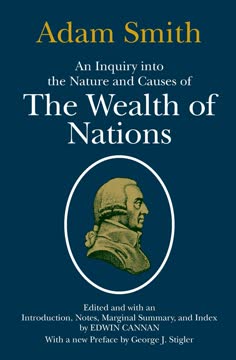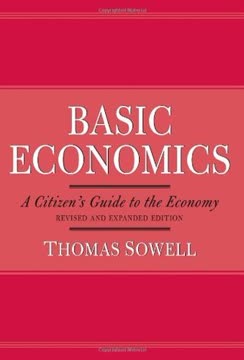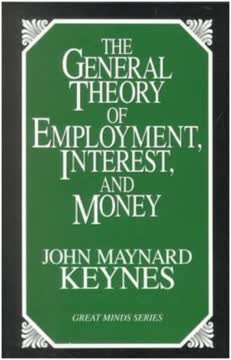Key Takeaways
1. Free markets harness self-interest for the common good
It is not from the benevolence of the butcher, the brewer, or the baker, that we expect our dinner, but from their regard to their own interest.
Invisible hand. Adam Smith's insight that individuals pursuing their own interests in a free market inadvertently benefit society as a whole remains a cornerstone of economic thought. In a competitive market, businesses must serve consumers to succeed, leading to innovation, efficiency, and better products and services. This "invisible hand" guides resources to their most valued uses without central planning.
Voluntary exchange. Free markets are based on voluntary transactions that benefit both parties. Consumers buy products they value more than the money they pay, while sellers receive payment they value more than the goods they provide. This mutually beneficial exchange creates value and increases overall welfare. Government intervention often disrupts this process by forcing involuntary exchanges or preventing voluntary ones.
2. Government intervention often leads to unintended consequences
The reign of tears is over. The slums will be only a memory. We will turn our prisons into factories and our jails into storehouses and corncribs. Men will walk upright now, women will smile, and the children will laugh. Hell will be forever for rent.
Good intentions, bad results. This quote, ironically praising Prohibition, illustrates how well-intentioned government policies often have disastrous unintended consequences. Prohibition led to organized crime, corruption, and dangerous black markets rather than solving social ills. Similarly, rent control leads to housing shortages, minimum wage laws increase unemployment among low-skilled workers, and farm subsidies often harm the farmers they intend to help.
Regulatory capture. Government agencies created to regulate industries often end up serving the interests of those industries rather than the public. The Interstate Commerce Commission, for example, eventually protected railroads and trucking companies from competition rather than protecting consumers. This "regulatory capture" occurs because regulated industries have strong incentives to influence regulators, while the general public's interests are diffuse.
3. Inflation is primarily a monetary phenomenon caused by government
Inflation is always and everywhere a monetary phenomenon in the sense that it is and can be produced only by a more rapid increase in the quantity of money than in output.
Money supply. Inflation occurs when the money supply grows faster than economic output. While various factors can cause temporary price increases in specific sectors, only an increase in the money supply can cause sustained, economy-wide inflation. Governments cause inflation by printing money to finance deficit spending or by pursuing expansionary monetary policies.
Political temptation. Politicians often resort to inflation as a hidden tax, allowing them to increase spending without explicitly raising taxes. This "magic" of getting something for nothing is illusory, as inflation erodes the purchasing power of money, effectively taxing all holders of currency. The short-term benefits of inflationary policies often lead to long-term economic instability and hardship.
4. Education reform requires more choice and competition
Few institutions in our society are in a more unsatisfactory state than schools. Few generate more discontent or can do more to undermine our liberty.
School choice. The authors advocate for a voucher system that would allow parents to choose their children's schools, including private options. This competition would force schools to improve or lose students, leading to better educational outcomes. The current public school monopoly lacks incentives for innovation and efficiency.
Decentralization. Education decisions should be made at the local level, closer to the students and parents affected. Centralized control leads to one-size-fits-all policies that fail to meet diverse needs. Greater school autonomy and parental involvement can lead to more innovative and effective educational approaches.
5. Labor unions often benefit their members at the expense of others
The gains that strong unions win for their members are primarily at the expense of other workers.
Restricted competition. Unions often seek to limit the supply of labor in their industry, driving up wages for members but reducing job opportunities for others. This can lead to higher unemployment and lower wages in non-unionized sectors of the economy.
Political influence. Unions use their political power to lobby for regulations that protect their members' interests, often at the expense of consumers and non-union workers. Examples include occupational licensing laws, minimum wage laws, and protectionist trade policies.
6. Consumer protection is best achieved through market competition
The great danger to the consumer is monopoly—whether private or governmental. His most effective protection is free competition at home and free trade throughout the world.
Market discipline. In a competitive market, businesses that provide poor products or service will lose customers to rivals. This creates a strong incentive for companies to maintain quality and keep prices reasonable. Government consumer protection agencies, by contrast, often stifle innovation and raise prices through burdensome regulations.
Information and reputation. Markets generate information about product quality through various mechanisms, including brand reputations, consumer reviews, and third-party certifiers. These sources of information, combined with consumers' ability to switch providers, offer more effective protection than government regulators can provide.
7. Social welfare programs can trap people in poverty
The most harm of all is done when power is granted to a single group in the name of helping a larger group.
Perverse incentives. Well-intentioned welfare programs often create disincentives to work and self-improvement. High marginal tax rates as benefits are withdrawn can make it financially disadvantageous for recipients to increase their income through work.
Dependency. Extensive welfare systems can create a culture of dependency, undermining personal responsibility and eroding the social fabric. This can lead to intergenerational poverty and a permanent underclass.
8. Economic freedom and political freedom are inextricably linked
Economic freedom is an essential requisite for political freedom.
Power dispersion. Free markets disperse economic power among many individuals and firms, preventing the concentration of power that threatens liberty. When the government controls the economy, it gains power over all aspects of life.
Independent base. Economic freedom provides individuals with the resources to oppose government overreach. Without economic independence, citizens become reliant on the state and less able to resist encroachments on their liberty.
9. Equality of opportunity, not outcome, should be the goal
A society that puts equality—in the sense of equality of outcome—ahead of freedom will end up with neither equality nor freedom.
Incentives matter. Attempts to enforce equality of outcome destroy the incentives for hard work, innovation, and risk-taking that drive economic progress. This leads to lower overall prosperity and often more inequality as connected elites game the system.
Freedom and diversity. True equality means equal treatment under the law and equal opportunity to pursue one's goals. Diversity of outcomes is a natural and desirable result of people's different talents, efforts, and preferences in a free society.
10. Sound money and stable prices are essential for economic prosperity
Inflation is a disease, a dangerous and sometimes fatal disease, a disease that if not checked in time can destroy a society.
Economic calculation. Inflation distorts price signals, making it difficult for individuals and businesses to plan for the future and allocate resources efficiently. This leads to malinvestment and reduced economic growth.
Social effects. High inflation erodes savings, hurts those on fixed incomes, and can lead to social and political instability. It often hits the poor and middle class hardest, as they are least able to protect themselves against its effects.
Last updated:
FAQ
What's Free to Choose: A Personal Statement about?
- Economic Freedom Focus: The book emphasizes the importance of economic freedom as a foundation for political freedom, advocating for minimal government intervention in the marketplace.
- Critique of Government Control: It critiques the expansion of government control in sectors like education, healthcare, and welfare, arguing that such interventions often lead to inefficiencies and reduced personal freedoms.
- Advocacy for Free Markets: The authors promote free markets as the best means to achieve prosperity and individual freedom, highlighting the benefits of voluntary cooperation and exchange.
Why should I read Free to Choose: A Personal Statement?
- Understanding Economic Principles: The book provides insights into fundamental economic principles, helping readers understand the relationship between economic policies and personal freedoms.
- Historical Context: It offers a historical perspective on economic thought and government intervention, crucial for understanding contemporary debates about capitalism and socialism.
- Influential Ideas: The ideas have influenced policymakers and economists worldwide, enhancing understanding of current economic issues and debates.
What are the key takeaways of Free to Choose: A Personal Statement?
- Economic Freedom is Essential: The Friedmans argue that economic freedom is crucial for political freedom and individual prosperity, advocating for minimal government interference.
- Critique of Welfare State: The book critiques welfare programs for creating dependency rather than empowerment, suggesting they undermine personal responsibility.
- Role of Government: The authors define a limited government role focused on protecting individual rights and maintaining order, opposing extensive economic control.
What are the best quotes from Free to Choose: A Personal Statement and what do they mean?
- "The only thing we have to fear is fear itself.": Emphasizes the importance of confidence in economic and political systems, warning against fear-driven decisions.
- "Experience should teach us to be most on our guard to protect liberty when the government's purposes are beneficial.": Warns against complacency regarding government power, even when intentions are good.
- "A society that puts equality—in the sense of equality of outcome—ahead of freedom will end up with neither equality nor freedom.": Highlights the conflict between enforced equality and personal liberty, suggesting that attempts to impose equality can lead to tyranny.
How do Milton and Rose Friedman define the role of government in Free to Choose: A Personal Statement?
- Limited Government Role: The authors advocate for a government role focused on protecting individual rights and maintaining order, without interfering in economic choices.
- Umpire, Not Participant: They liken the government's role to an umpire ensuring fair play, underscoring their belief in minimal intervention.
- Protection Against Coercion: Emphasize that government should protect citizens from coercion, essential for maintaining freedom.
What is the Friedmans' view on the welfare state in Free to Choose: A Personal Statement?
- Dependency vs. Empowerment: They argue welfare programs create dependency rather than empowering individuals to improve their circumstances.
- Inefficiency of Government Programs: Critique government-run programs for wasting resources and failing to deliver quality services, advocating for private solutions.
- Negative Income Tax Proposal: Propose a negative income tax as a more effective way to provide assistance without creating dependency, promoting self-sufficiency.
How do the Friedmans connect economic freedom to political freedom in Free to Choose: A Personal Statement?
- Interdependence of Freedoms: Argue that economic and political freedoms are interdependent, with economic freedom necessary for exercising political rights.
- Dispersal of Power: Suggest that free markets disperse power among individuals, preventing any single entity from becoming too powerful.
- Historical Examples: Provide examples showing how economic control often leads to political oppression, advocating for economic freedom to ensure political freedom.
What is the concept of the "invisible hand" in Free to Choose: A Personal Statement?
- Market Coordination: Refers to the self-regulating nature of the marketplace, where individual actions driven by self-interest lead to societal benefits.
- Voluntary Exchange: Emphasizes that voluntary exchanges create value for both parties, occurring without central planning or coercion.
- Critique of Central Planning: Illustrates that government intervention disrupts market coordination, arguing for the effectiveness of free markets.
How does Free to Choose: A Personal Statement address inflation?
- Cause of Inflation: Argues that inflation is primarily caused by excessive government spending and monetary policy, eroding purchasing power.
- Monetary Policy Recommendations: Advocates for sound monetary policy, including limiting money supply growth, to control inflation.
- Historical Context: Provides historical examples of inflationary periods to illustrate the consequences of poor monetary policy.
What solutions do the Friedmans propose for the issues discussed in Free to Choose: A Personal Statement?
- Embrace Free Markets: Propose embracing free markets to solve economic and social issues, reducing government intervention for greater prosperity.
- Implement School Choice: Advocate for school choice and educational reforms to improve education quality through competition.
- Reform Welfare Programs: Suggest reforming welfare programs to reduce dependency, proposing a negative income tax for effective assistance.
What is Friedman’s view on education in Free to Choose: A Personal Statement?
- Critique of Public Education: Criticizes public education for inefficiencies and lack of accountability, attributing decline to government control.
- School Choice Advocacy: Advocates for school choice, including vouchers, to improve education through competition.
- Role of Parents: Stresses the importance of parental involvement and freedom to choose the best educational options for their children.
How does Friedman view the relationship between government spending and inflation in Free to Choose: A Personal Statement?
- Government Spending Drives Inflation: Asserts that excessive government spending, especially when financed by printing money, leads to inflation.
- Political Incentives: Discusses political incentives for governments to increase spending without raising taxes, resulting in inflation as a hidden tax.
- Need for Fiscal Restraint: Calls for greater fiscal restraint and accountability in government spending to combat inflation effectively.
Review Summary
Free to Choose is widely praised for its clear arguments in favor of free market economics and limited government intervention. Readers appreciate Friedman's logical reasoning and accessible writing style, though some find parts dry or outdated. The book covers topics like inflation, education, and welfare, presenting a libertarian perspective. While not everyone agrees with all of Friedman's ideas, many find the book thought-provoking and influential. Some criticize the lack of hard data to support claims, but overall it's considered an important work on economics and individual freedom.
Similar Books










Download PDF
Download EPUB
.epub digital book format is ideal for reading ebooks on phones, tablets, and e-readers.





